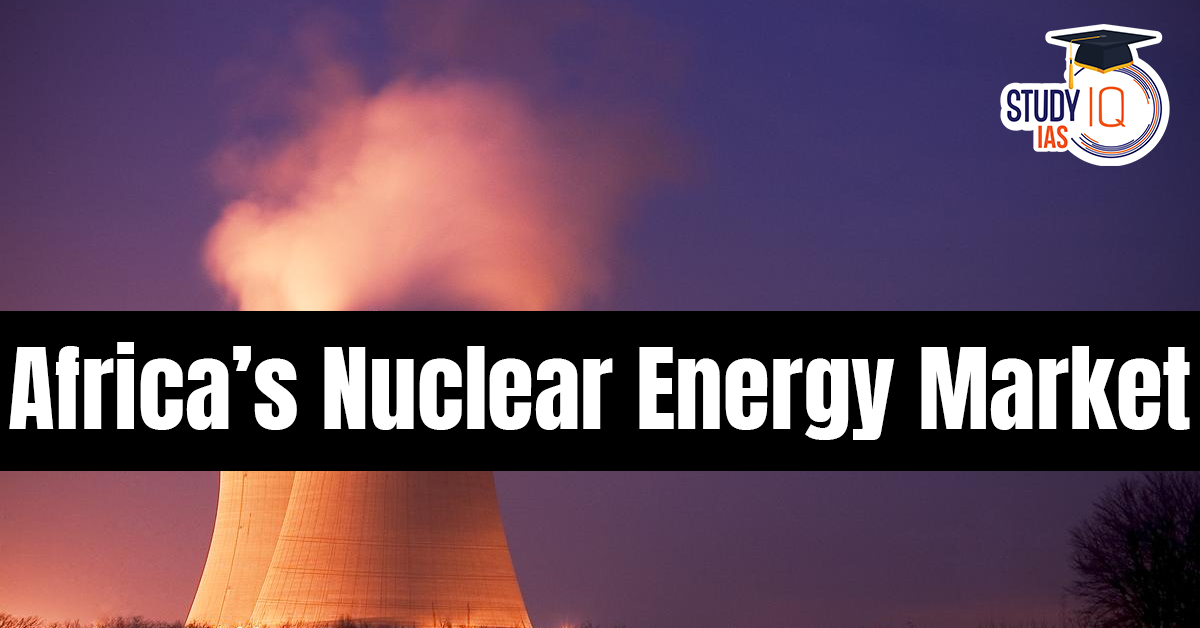Table of Contents
Context: China has emerged as an attractive partner for African countries interested in developing nuclear energy.
Status of Africa’s Nuclear Energy
Current Capacity
- Africa currently has only one operational nuclear plant — the Koeberg Nuclear Power Station in South Africa, built by a French consortium.
- Despite having vast untapped potential, Africa’s nuclear energy sector is still in its early stages.
Projected Growth
- Africa is expected to generate 15,000 MW of nuclear energy by 2035.
- This represents a major investment opportunity of $105 billion.
- Countries like Ghana, Nigeria, Sudan, Rwanda, Kenya, and Zambia have announced plans to develop nuclear energy to enhance electricity access.
How Other Countries Are Partnering with Africa for Nuclear Energy
France
- Historically dominated Africa’s nuclear market, especially in Francophone Africa.
- However, France’s influence is declining due to increased competition from other global powers.
United States
- Since 2023, the U.S. has been organising the US-Africa Nuclear Energy Summit (USANES).
- Future engagement depends on the policy direction under President Donald Trump.
- Ghana has already partnered with U.S.-based companies like NuScale Power and Regnum Technology Group for Small Modular Reactors (SMRs).
Russia
- Russia’s Rosatom has been constructing a nuclear reactor in El Dabaa, Egypt since July 2022 (though progress has been slow).
- Russia has signed agreements with Egypt, Mali, Burkina Faso, and Burundi.
- However, Russia’s economic challenges due to the Ukraine war and sanctions could limit its ability to fund large-scale nuclear projects in Africa.
South Korea
- South Korea’s Korea Hydro and Nuclear Power (KHNP) have shown interest in Africa’s nuclear market.
- However, its involvement remains limited compared to China and Russia.
How China Leads the Race in Africa’s Nuclear Market
Early Strategic Moves
- China’s involvement began in 2012 with a scholarship program for African and South Asian students in nuclear energy, sponsored by the China Atomic Energy Authority and the International Atomic Energy Agency (IAEA).
- This helped train African professionals in Chinese nuclear technology and procedures.
State-Owned Companies Driving Expansion
Two major state-owned firms are leading China’s nuclear expansion in Africa:
- China General Nuclear Power Group (CGN)
- China National Nuclear Corporation (CNNC)
Recent Agreements
In 2024, at the Forum on China-Africa Cooperation (FOCAC):
- Nigeria signed an MoU with China for the design, construction, operation, and maintenance of nuclear power stations.
- Uganda signed an MoU with China to build a 2 GW nuclear plant (the first unit of 1 GW is expected to be operational by 2031).
- Kenya plans to have a research reactor by 2030 but has yet to confirm its partner.
- Ghana partnered with China National Nuclear Corporation to build a Large Reactor (LR).
Pro-Russian African States Leaning Toward China
- The junta-led governments of Burkina Faso, Niger, and Mali initially approached Russia’s Rosatom for nuclear capacity.
- However, given Russia’s financial constraints, these countries may increasingly rely on Chinese funding and expertise.
Belt and Road Initiative (BRI)
- China’s ability to build nuclear plants and the transmission networks needed to distribute electricity gives it a strategic advantage.
- African nations may turn to BRI-linked financing to support nuclear infrastructure development.
Africa’s Nuclear Energy Market Impact on India
- India’s Nuclear Generation Capacity: As of January 30, 2025, India’s nuclear generation capacity stands at 8,180 MW.
- India’s goal is to generate 100 GW of nuclear energy by 2047.
- Dependence on African Uranium: Africa is critical for India’s nuclear fuel supply:
- In 2009, India signed a civil nuclear cooperation agreement with Namibia.
- India also plans to develop uranium mining projects in Niger and Namibia.
- Challenge from China’s Dominance: With China’s growing influence in Africa’s nuclear sector, securing long-term uranium supplies may become more difficult for India.
- Increased Chinese involvement could create geopolitical hurdles for India’s nuclear fuel strategy and overall energy security.
- Potential Diplomatic and Strategic Balancing: To counter China’s dominance, India may need to:
- Strengthen strategic ties with African nations through energy partnerships.
- Enhance India’s nuclear cooperation framework with African countries beyond uranium sourcing.
Conclusion
Africa’s nuclear energy sector is poised for rapid growth, with a projected capacity of 15,000 MW by 2035 and an investment opportunity of $105 billion. China is currently leading the race, leveraging its state-backed companies and financing under the Belt and Road Initiative. Other major players like the U.S., Russia, France, and South Korea are competing for influence but face financial or strategic limitations. For India, securing African uranium will be essential to achieving its nuclear energy targets, but rising Chinese dominance could complicate these efforts.


 United States Federal Reserve (US Fed)
United States Federal Reserve (US Fed)
 EU Naval Force Operation Atlanta propose...
EU Naval Force Operation Atlanta propose...
 Global Labour Shortage and Opportunities...
Global Labour Shortage and Opportunities...






















